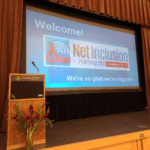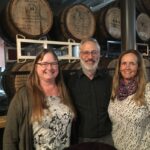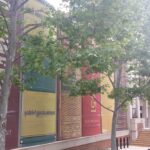February 2024 Net Inclusion Conference Report
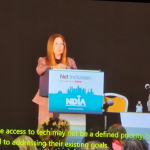 The National Digital Inclusion Alliance’s (NDIA) annual conference occurred in Philadelphia, Pennsylvania from February 13 through the 15th in 2024. With over 1300 attendees, it was the largest digital inclusion conference to date. Many parts of the conference were live-streamed and are available on YouTube. Maryanna Milton, Barry Glicklich and Katherine Lato attended the full conference. Presentation information and background resource notes for the breakout sessions, along with collaborative notes from session attendees are all on sched. (Click on the link to a session you are interested in, then find the link to Collaborative Note-Taking Document and click on that.
The National Digital Inclusion Alliance’s (NDIA) annual conference occurred in Philadelphia, Pennsylvania from February 13 through the 15th in 2024. With over 1300 attendees, it was the largest digital inclusion conference to date. Many parts of the conference were live-streamed and are available on YouTube. Maryanna Milton, Barry Glicklich and Katherine Lato attended the full conference. Presentation information and background resource notes for the breakout sessions, along with collaborative notes from session attendees are all on sched. (Click on the link to a session you are interested in, then find the link to Collaborative Note-Taking Document and click on that.
Key Messages/Themes:
- Relationships are very important. Build them. Maintain them.
- Win the trust of the people.
- We don’t have years to adapt to technology changes.
- Infect other people with the virus of digital equity.
- It’s not a sprint, it’s a marathon. Life-long transformative experience.
- Respect that each person being helped is a unique person with unique needs.
- Don’t reinvent the wheel.
- Remember to consider both breadth and depth of the solutions you provide.
- Take an interdisciplinary approach–bring in as many perspectives as possible.
- Data Collection is a part of every state equity plan. Include this in your plans.
- Craft the communication based on feedback from coalitions.
- Read your state’s broadband plan and talk to the people at the state level.
- Live your life building authentic relationships.
August 2023 Newsletter
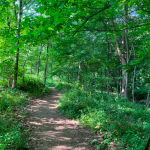 This newsletter contains information on:
This newsletter contains information on:
- Experience paper: Swag
- State Coalition Website Initiative
- Net Inclusion 2024
- Wordcloud: Just for fun
Swag Experience paper
We have just released our new experience paper: Swag: Best, Worst and Why. Read about our partners’ experiences giving and receiving swag and look for an additional incentive to come to Net Inclusion in Philadelphia to receive PBDD’s latest swag gift and raise a glass with us.
March 2023 Newsletter
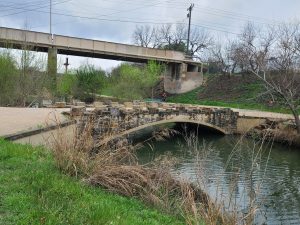 This newsletter contains information on:
This newsletter contains information on:
- State Coalition Website Initiative
- Net Inclusion 2023 Conference Report
- AFTRR 2023 Conference Report
State & Regional Coalition Initiative
Board members of Partners Bridging the Digital Divide have been participating in some of the state coalitions that are springing up around the country, and in these efforts, have noticed that these coalitions often have a need for a website to collect information and raise awareness.
March 2023 Net Inclusion Conference Report
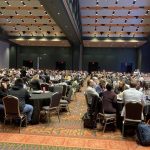 The National Digital Inclusion Alliance’s (NDIA) annual conference occurred in San Antonio Texas from February 28
The National Digital Inclusion Alliance’s (NDIA) annual conference occurred in San Antonio Texas from February 28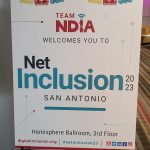 through March 2nd. Maryanna Milton, Barry Glicklich and Katherine Lato attended the full conference and reported on their sessions.
through March 2nd. Maryanna Milton, Barry Glicklich and Katherine Lato attended the full conference and reported on their sessions.
Key Messages/Themes:
- Contact your state broadband office.
- Beyond Digital Literacy: Digital Skill-building, Resilience, and Fluency
- We need to build a Digital Equity Ecosystem
- Digital Divide is the problem. Digital Equity is the goal. Digital Inclusion is the process.
- Money isn’t the only resource people can give us, having a direct conversation partner can be valuable.
- Find your people. It was said at the first conference in 2016, and is still valid today.
- This is our moment. Consider how to build sustainable solutions with the current wave of funding.
December 2022 Newsletter
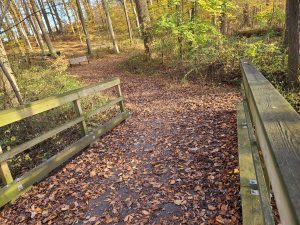
This newsletter contains information on:
- Interactive Session: Client Feedback
- Experience Paper: Effective Programs
- Partner Report: Digital Inclusion Week
- Net Inclusion 2023
August 2022 Newsletter
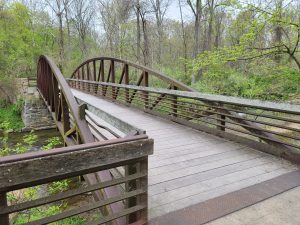 This newsletter contains information on:
This newsletter contains information on:
- Partner Grants
- Website Revamp
- Experience Paper: Programs
- Lessons from ODLAN
Partner Grants
PBDD thanks all of our partners for participation in our speedy grant process.
Congratulations to IBSA, RSVP, …
February 2022 Net Inclusion Conference Report
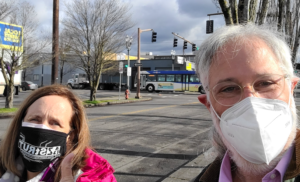 After a hiatus of two years due to COVID-19, NDIA’s Net Inclusion live conference reconvened in February at the Portland State University campus. Maryanna Milton and Barry Glicklich from Partners Bridging the Digital Divide (PBDD) were among the 327 in person attendees and Katherine Lato (also from PBDD) was among the 500 virtual attendees. Detailed notes (30+ pages) from the sessions attended by Barry, Maryanna or Katherine is available in this google document. Recordings of the video are available at this YouTube playlist.
After a hiatus of two years due to COVID-19, NDIA’s Net Inclusion live conference reconvened in February at the Portland State University campus. Maryanna Milton and Barry Glicklich from Partners Bridging the Digital Divide (PBDD) were among the 327 in person attendees and Katherine Lato (also from PBDD) was among the 500 virtual attendees. Detailed notes (30+ pages) from the sessions attended by Barry, Maryanna or Katherine is available in this google document. Recordings of the video are available at this YouTube playlist.
Main Take-aways
- The digital inclusion community is vibrant and growing.
- There are large sums of federal money coming for broadband and digital equity.
- Organizations should establish relationships with state and local broadband offices, and help them to help us help our clients.
- NDIA did a wonderful job addressing the requirements in the age of COVID-19, and the Dine Around was a great program that helped create new connections in a friendly informal setting.
November 2021 Newsletter
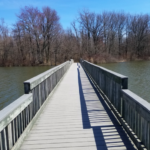 This newsletter contains information on:
This newsletter contains information on:
- Net Inclusion 2022
- Progress on Digital Equity funding
- Partner Engagement
Net Inclusion 2022
Registration is open for Net Inclusion 2022 in Portland in February. Net Inclusion is the NDIA-sponsored conference bringing together people engaged in all aspects of digital equity, practitioners, policy-makers, and researchers. It has been a wonderful experience for connecting and learning from others, and PBDD encourages their partners to attend, if it is possible.
To facilitate this, PBDD has a limited number of scholarships available to assist agencies to cover the registration and a small stipend. If this would make the difference in being able to attend, please contact us.
March 2021 Newsletter
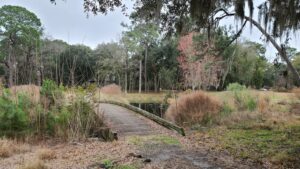 This newsletter contains information on:
This newsletter contains information on:
- PBDD Hosting virtual reception- with drink recipes
- Reflections on the past year
- Net Inclusion webinar series in April and May
PBDD-sponsored Net Inclusion Reception
Partners Bridging the Digital Divide is proud to sponsor the Net Inclusion On-line Reception.
It will be held on April 7, 2021 at 7:30 pm EDT/6:30 CDT/5:30 MDT/4:30 PDT/MST
Click here to register. After registering, you will receive a confirmation email containing information about joining the meeting.
August 2020 Newsletter
 This newsletter contains information on:
This newsletter contains information on:
- Net Inclusion webinar series in September and October
- New category on our web site — Equity
- Experience with website migration. (We moved from Go Daddy to Bluehost)
- Do you need a website tester?
December 2019 Newsletter
This newsletter contains information on:
- Partner Profile for Computers 4 Kids
- Plans for Portland in April, 2020, including AFTRR meeting, Net Inclusion 2020 conference, and a Digital Inclusion Seder
- Reminder about MAPPINGS.
- Upcoming Experience Papers
- An end of year fundraising story
September 2019 Newsletter
This newsletter contains information on:
- Sharing Success Stories, our latest Experience Paper
- MAPPINGS Grants- a simple way to get funds for new initiatives
- Plans for Portland in April, 2020, including AFTRR meeting and Net Inclusion 2020 conference
- Information about Digital Inclusion Week
AFTRR 2019 Meeting
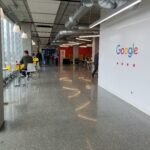 The Alliance for Technology Refurbishing and Reuse (AFTRR) consists of nonprofit technology refurbishers seeking to increase the awareness of the contributions of their organizations, individually and collectively, to a wide range of populations in need. The AFTRR 2019 meeting was held in the Chicago on June 13th and 14th, hosted by the generosity of Google.
The Alliance for Technology Refurbishing and Reuse (AFTRR) consists of nonprofit technology refurbishers seeking to increase the awareness of the contributions of their organizations, individually and collectively, to a wide range of populations in need. The AFTRR 2019 meeting was held in the Chicago on June 13th and 14th, hosted by the generosity of Google.
Bud Rizer, former executive director of the National Cristina Foundation, welcomed the attendees and presented information on data collection by AFTRR, encouraging all members to complete the surveys. The purpose of this information is to better market AFTRR services to donors and to help establish relationships with other AFTRR members.
The day and a half workshop had panels divided into several areas such as: sourcing, refurbishing, distribution, support, social media, finances and sustainability.
April 2019 Net Inclusion Conference Report
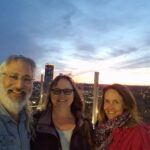 Net Inclusion – NDIA 2019
Net Inclusion – NDIA 2019
Conference Report from Partners Bridging the Digital Divide
By: Katherine Lato, Maryanna Milton, Barry Glicklich
We attended the 2019 Net Inclusion conference in Charlotte on April 1-3. The following notes are from the sessions/activities that PBDD attended, reflecting only a subset of the conference. Many of the slides from presentations are available at https://netinclusion2019.sched.com/ along with information about the speakers. Livestream of some sessions (the ones in the main room) are available.
Thank you to The Knight Foundation for providing a lot of support for this conference and to all the sponsors. The food was wonderful, and the opportunities to socialize and network were most appreciated. The NDIA staff, volunteers, and participants once again did a tremendous job of pulling together those engaged in digital inclusion into a community, and we thank them.
Our main takeaways from the conference:
- While political philosophy differences may prevent agreement on broadband as a right, whether equipment given away is valued, and the role of government in making broadband affordable, there seems to be agreement that addressing the Homework Gap is something we as society should do to ensure that the next generation is getting the education they need to succeed
- Partnership is critical. Many organizations are able to perform “above their weight” because they partner. Example Winterset community schools partner with local businesses to get students broadband.
- When presenting information, try to avoid being text heavy. An example of cookies and how they are used can be as non-word focused as having someone wear a t-shirt with a photo of a computer on it walking around taking pieces of cookies and storing them in a cookie jar. Then matching the cookie with the person when they revisit the site. For a full example, see NYC Digital Safety training.
- Learning is an ongoing activity, with goal setting being important. People can explore and follow their interest and learn more and teach more.
- Providing broadband to the economically challenged can be a good business decision. For example, with prepaid plans, there’s no need for a credit check, and users can pay for access when they can afford it, and when they most need it.
- As a community and a movement, we have raised public awareness of the issue of digital inclusion, and potential for progress is evident in the Digital Equity Act being introduced in the US Congress.
The full report (20+ pages) is available as a google document, under terms of Creative Commons Attribution-ShareAlike.
January 2019 Newsletter- Refurbishing Reflections, SDFF Partner Profile, Net Inclusion 2019
There are several items in this newsletter:
- reflections on the last year
- Net Inclusion 2019 in Charlotte
- a writeup from Maryanna Milton on becoming a computer refurbisher
- a partner profile of San Diego Futures Foundation
Another Good Year
As we conclude our fourth year (our fiscal year ends in February), I want to thank all of our partners, affiliates, donors, and volunteers who have helped us make a difference in digital inclusion. As of this date, we have thirty-two partner agencies, almost 200 pages of content, and over 17,000 views. We look forward to adding more newsletters, white papers, partner profiles, and additional resources in the coming year. If you work with agencies that may be interested in partnering with PBDD, please let us know.
Net Inclusion 2019
We encourage all of our partners and those involved in digital inclusion to attend Net Inclusion 2019, being held in Charlotte, NC from April 1-3. Early registration ends February 14. The sponsor, National Digital Inclusion Alliance (NDIA), is a member-based organization (basic membership is free) that provides a unified voice for broadband access, personal devices and local technology training and support programs.
Through a generous grant, PBDD is able to offer a limited number of scholarships to cover the cost of conference registration. If you are interested, please contact us. If you will be attending, please plan to join us for a PBDD Partners get-together, immediately following the reception on Monday, April 1.
October 2018 Newsletter
As part of our efforts to keep you informed about what we’re working on, this newsletter addresses the following three items:
- Measuring impact
- PBDD workshop plans
- New partner profile
1) After several mostly unsuccessful attempts to get answers to a series of questions from our partners, we are setting aside our plan to write a white paper on measuring impact. Thank you to those who did discuss this topic with us. Even without a published white paper, it helped increase our knowledge on this subject. It can be daunting to get started, so we recommend that all nonprofit partners fill in the ‘Charting Impact’ information on GuideStar. The following examples may help:
- C2SDK GuideStar
- Connected Nation Guidestar
- FreeGeek 2017 impact report
- IBSA, Inc. GuideStar
- PBDD GuideStar and web page documenting how we measure impact
- PRC GuideStar
- San Diego Futures Foundation GuideStar
- Note: If we missed anyone, please let us know and we’ll update this list.
June 2018 Learning Circles Workshop Report
By Katherine Lato
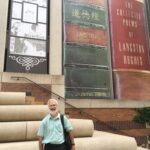 We were invited to attend the p2pu.org workshop in Kansas City since we had used their model for peer-to-peer training and written up our results in a white paper. The following is PBDD’s impression of the workshop and what we learned. The organizers gathered a lot of information from the workshop and are using that in planning. They have shared this with workshop participants and will undoubtedly have more information on their website. Here’s the information they provided prior to the workshop: https://kc2018.p2pu.org/
We were invited to attend the p2pu.org workshop in Kansas City since we had used their model for peer-to-peer training and written up our results in a white paper. The following is PBDD’s impression of the workshop and what we learned. The organizers gathered a lot of information from the workshop and are using that in planning. They have shared this with workshop participants and will undoubtedly have more information on their website. Here’s the information they provided prior to the workshop: https://kc2018.p2pu.org/
Since we think learning circles, or peer-to-peer learning, are a very useful way to increase the completion rate of online training, and we are thinking of having a PBDD workshop at the next NDIA conference, we found this very well-run workshop useful. Barry and I have experience with conferences and workshops in the corporate world, but not as much in the nonprofit world. Some of the things that made this a good workshop included:
April 2018 Net Inclusion Conference Report
By: Katherine Lato, Maryanna Milton, Barry Glicklich
On April 17-19, we attended the 2018 Net Inclusion conference in Cleveland. The following notes are from the sessions/activities that PBDD attended, reflecting only a subset of the conference. Many of the slides from presentations are available at: https://netinclusion2018.sched.com/list/descriptions/ along with information about the speakers.
Thank you to The Cleveland Foundation for providing a lot of support for this conference and to all the sponsors. The food was wonderful, and the opportunities to socialize and network were most appreciated. NDIA staff, volunteers, and participants once again did a tremendous job of pulling together those engaged in digital inclusion into a community, and we thank them.
Our main takeaways from the conference:
- The internet today is like electricity was 100 years ago, in the process of rolling out and changing people’s lives and opportunities, but with some substantial differences. There are multiple classes of service that are evolving over time.
- It is inspiring to be around people who care about digital inclusion and are willing to work to ensure that everyone has good access to the internet. Sharing experiences and lessons learned is an invaluable opportunity.
- Libraries are a key participant in digital inclusion.
- People are accessing two different internets. If your internet is phone based, that is very different from broadband access to your home. The term ‘leaner’ means someone who doesn’t have home internet access and leans against a building with a mobile device to get wifi access.
- With self assessment, some students reported feeling less knowledgeable, reflecting that they learned how much they didn’t know.
- If you couldn’t attend the conference, or even if you did, you might want to go through the slides available and read about the people who attended.
- While the weather wasn’t very good, the food and welcoming people in Cleveland were marvelous.
February 2018 Newsletter- Ontario Digital Inclusion Summit and C2SDK Partner Profile
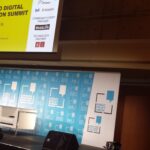
Partner Profile: C2SDK
In January, Katherine and I visited California, where we had the opportunity to visit several partners, including Computers to San Diego Kids, Human-I-T, and San Diego Futures Foundation.
See here for our full partner profile of C2SDK. We met with Chéri Pierre, the Chief Executive Officer of Computers 2 SD Kids on January 23, 2018 in San Diego, CA. Collaboration was a strong theme of our conversation. As Chéri said, “Collaboration is good. Your organization can then be efficient in the budget, not try to do things that someone else can do better. The refurbishing industry is more collaborative than many nonprofits.”
December 2017 Newsletter
Our recent travels took us to western New York where we had a rewarding meeting with Renee Cerullo, President of Ed Tech. We were able to gain insight for a partner profile that is available at: pbdd.org/ed-tech-november-2017
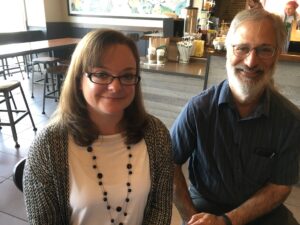 As an all-volunteer organization based in Buffalo, NY, Ed Tech of Western New York seeks to enrich the lives of children by improving access to computer technology. They have an interesting model with ‘Ed Tech Days’ where an amazing amount of work gets done. If you know someone who is interested in improving computer access in a new city, their example could be useful. The ‘Ed Tech Day’ model could also be a way to mix things up with your current volunteer efforts.
As an all-volunteer organization based in Buffalo, NY, Ed Tech of Western New York seeks to enrich the lives of children by improving access to computer technology. They have an interesting model with ‘Ed Tech Days’ where an amazing amount of work gets done. If you know someone who is interested in improving computer access in a new city, their example could be useful. The ‘Ed Tech Day’ model could also be a way to mix things up with your current volunteer efforts.
Throughout the year, we add information to our website. Some recent additions/updates that might be of particular interest are:
- Map of partners
- Updated low cost access options page
- Current list of conferences of interest
- Link to Right to repair
- Bridging the Gap (PCs for People partnership with Mobile Beacon.)
- Ability to search the site
October 2017 Newsletter
 We just released a new partner profile on Arzona Students Recycling Used Technology (AZStRUT) at https://pbdd.org/partner-profiles thanks to board member Maryanna Milton. When possible, we like to include a visit with a partner profile, so hopefully, our travels will take us to your location. When we travel, we tend to take pictures of bridges, and have compiled several pages of bridges that you are free to use since they are under a creative commons license. They are available at: https://pbdd.org/pictures-of-bridges/
We just released a new partner profile on Arzona Students Recycling Used Technology (AZStRUT) at https://pbdd.org/partner-profiles thanks to board member Maryanna Milton. When possible, we like to include a visit with a partner profile, so hopefully, our travels will take us to your location. When we travel, we tend to take pictures of bridges, and have compiled several pages of bridges that you are free to use since they are under a creative commons license. They are available at: https://pbdd.org/pictures-of-bridges/
We are planning to host a pre-conference workshop/get-together of PBDD partners in conjunction with the next NDIA conference, April 17-19 in Cleveland. If anyone has specific items they’d like to discuss, please let us know. We get a lot out of these conferences and encourage all of our partners to join NDIA (it is free to affiliate) and to attend the conference if you are able. Details are available at: https://digitalinclusion.org/netinclusion2018/
June 2017 Newsletter
 This newsletter is about the release of a white paper on fundraising, a new partner profile (that we were asked to delete in 2020, so we have) and updated web pages.
This newsletter is about the release of a white paper on fundraising, a new partner profile (that we were asked to delete in 2020, so we have) and updated web pages.
Our fourth white paper, The Experience of Fundraising, published in June 2017, was based on a series of questions with phone interviews. Thanks to all who contributed. The white paper is available as PDF or HTML. Recommendations include:
- Take advantage of region-specific opportunities at the city or state level.
- Tell stories to get free advertising and more donations.
- Cultivate relationships with donors, volunteers, and potential donors. Thank you is more important than please, but say both.
- Remember, your situation is unique so experiment to determine what works best for you.
May 2017 newsletter – NDIA conference report
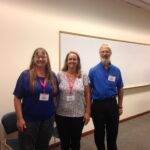
 Katherine Lato, Maryanna Milton and Barry Glicklich of PBDD went to the National Digital Inclusion Alliance (NDIA)’s conference in St. Paul, MN on May 16-17th. This was the second annual conference sponsored by NDIA. The Net Inclusion conference at St. Paul Library and City Hall included digital inclusion advocates from local government, non-profits, academia, and industry. It was a wonderful atmosphere of sharing and creating connections. This is a report from all three of us at PBDD.
Katherine Lato, Maryanna Milton and Barry Glicklich of PBDD went to the National Digital Inclusion Alliance (NDIA)’s conference in St. Paul, MN on May 16-17th. This was the second annual conference sponsored by NDIA. The Net Inclusion conference at St. Paul Library and City Hall included digital inclusion advocates from local government, non-profits, academia, and industry. It was a wonderful atmosphere of sharing and creating connections. This is a report from all three of us at PBDD.
Our key takeaways:
- Don’t reinvent the wheel, so see if someone else has solved the issue you’re having.
- There isn’t a single path to using computer technology. Find people’s interests and use projects to drive learning. For example, if someone is interested in knitting, they can use technology to find patterns.
- Engage those with an outside perspective in digital inclusion. Meet them where they are, using their language to identify how digital inclusion can help with their issues.
- Teach people critical thinking while using computers, not just how to use a particular computer.
December 2016 Newsletter – Partner Profile, White Paper, plans
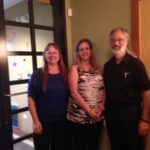 This is the time of year when many families send out a wrap-up of their year, so here’s a bit of what we’ve been up to with PBDD.
This is the time of year when many families send out a wrap-up of their year, so here’s a bit of what we’ve been up to with PBDD.
We released our third white paper, Computer Refurbishing Process, that presents an overview of the steps to refurbish computers based on the People’s Resource Center process. All of our white papers are now also available in HTML format, which means they should show up in a search of the website.
October 2016 Newsletter – First Fund-raiser
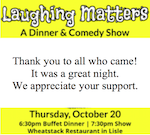 PBDD teamed with the People’s Resource Center to present a night of food and laughter for fifty people on October 20th. We titled the event, ‘Laughing Matters,’ and PBDD board member Maryanna Milton ended the evening by thanking everyone and encouraging us to ‘make someone laugh.’
PBDD teamed with the People’s Resource Center to present a night of food and laughter for fifty people on October 20th. We titled the event, ‘Laughing Matters,’ and PBDD board member Maryanna Milton ended the evening by thanking everyone and encouraging us to ‘make someone laugh.’
The comedy was donated by Chicago’s Comedy Scene for a Make-A-Wish® charity event. Katherine & Barry were the winning bid. The Chicago’s Comedy Scene graciously supported Make-A-Wish, PBDD, and PRC with this event and provided audio as well as a fine comedic line-up.
August 2016 Newsletter – Using a hotspot for broadband access
In July and August, PBDD experimented with two low-cost mobile broadband providers and we would like to share our experience and information about hotspot offers with our partners. Mobile Beacon and Mobile Citizen are non-profits which work with Sprint and their LTE network to provide wireless broadband connectivity. Both provide access to the Sprint LTE network for use by non-profits and schools via a hotspot for the cost of equipment plus $120 per year.
Download speeds (via testmy.net) are typically 4-8 Mbps, slower than the top speed of many wired providers, but adequate for the needs of many small organizations. In our case, we are currently using it as a secondary backup network to our current wired service. Each hotspot device supports up to ten wifi-connected clients.
June 2016 Newsletter – Net Inclusion Conference
 Net Inclusion – May 18-19, 2016, Kansas City, MO
Net Inclusion – May 18-19, 2016, Kansas City, MO
There are a lot of links in this material, we encourage you to explore the ones of most interest to you.
Key points:
- It’s an exciting time for digital inclusion.
- Kansas City, Minneapolis and Seattle have a lot of experience with digital inclusion initiatives and can serve as models for other communities.
- There is a great willingness to share experiences, which is helping us all.
- In completing grant applications, refurbishers should stress the case for environmental benefits.
- There are innovative ways to increase knowledge such as the Kansas City library’s bookmarks on how to add an attachment in email.
The National Digital Inclusion Alliance and the Kansas City Public Library welcomed digital inclusion practitioners, advocates, academics, Internet service providers and policymakers to Net Inclusion 2016. The agenda page lists the slides from particular sessions or they can be found here. The attendees included many libraries, non-profits, some vendors, policy-makers and a few refurbishers.
March 2016 Newsletter – White paper, NDIA, EveryoneOn
Thanks to all who contributed comments to PBDD-White Paper: Lessons from Starting a Bridging Agency. We encourage you to share it with others as part of your organization’s publicity. To make it easy to find them, we’ve created an Experience Papers web page.
The National Digital Inclusion Alliance http://www.digitalinclusionalliance.org/ started last year to provide a unified voice for local technology training, home broadband access and public broadband access programs. The NDIA has been doing great work in advocacy with the FCC for Lifeline services. They are building community among organizations working to increase digital inclusion.
December 2015 Newsletter – Conferences
 It has been a great run-up to the end of the year with conferences that helped clarify our purpose and extend our contacts. Vice-President Maryanna Milton attended the Partnership for Progress on the Digital Divide (PPDD) conference in Scottsdale Arizona in October. We’ve put together a summary of that conference at PPDD 2015 Conference Report.
It has been a great run-up to the end of the year with conferences that helped clarify our purpose and extend our contacts. Vice-President Maryanna Milton attended the Partnership for Progress on the Digital Divide (PPDD) conference in Scottsdale Arizona in October. We’ve put together a summary of that conference at PPDD 2015 Conference Report.
Shortly thereafter, President Barry Glicklich and Vice-President of Communications Katherine Lato attended the Electronics Reuse Conference in New Orleans followed by a visit to Lutheran Social Services of North Florida. See the write-up for the conference at Electronics Reuse Conference Report 2015
December 2015 – Partnership Conference Report
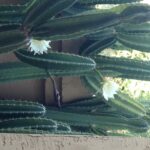 Partnership for Progress on the Digital Divide highlights:
Partnership for Progress on the Digital Divide highlights:
- Mix of academics, non-profits and policymakers from around the world.
- Emphasis on broad-band adoption.
Partnership for Progress on the Digital Divide 2015 Conference Report
Board member Maryanna Milton attended the conference in Phoenix, Arizona in October. She was part of a panel on ‘Challenges and Opportunities of Bridging the Digital Divide in Communities’ with a presentation entitled, “Practical Experience from Two Illinois Non-profits Bridging the Digital Divide,” describing the activities of PBDD and People’s Resource Center.
November 2015 – Electronic Reuse Conference Report
- A transition from computers to mobile devices is underway, bringing challenges and opportunities for refurbishers
- There is a growing movement to push for Digital Right to Repair, and a trade association to push for this is in the process of being formed.
- Non-profit refurbishers can find free access to membership in Tradeloop and heavily discounted hardware/software resources through TechSoup.
- Look at iFixit for repair manuals on a wide variety of devices including mobile.
- Even for-profit companies may have plans to donate computers.
- While Apple products have repair challenges, software issues are easier (factory reset iPhone to wipe data, no software license needed for Apple software on Apple hardware.)
September 2015 Newsletter – Visiting a Partner, Course Material Added
This is the second newsletter targeted to PBDD’s partner agencies.
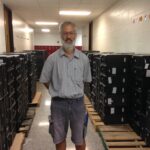
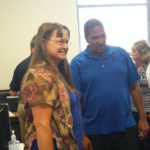 Barry and I had a great visit with Net Literacy in Indianapolis in July. You can read about it at our partner profile. Our intention is to visit partners, or potential partners, whenever our personal travel puts us in the vicinity. We are going to be in New Orleans for the Electronics Reuse Conference in early November, and hope to visit Lutheran Social Services of North Florida.
Barry and I had a great visit with Net Literacy in Indianapolis in July. You can read about it at our partner profile. Our intention is to visit partners, or potential partners, whenever our personal travel puts us in the vicinity. We are going to be in New Orleans for the Electronics Reuse Conference in early November, and hope to visit Lutheran Social Services of North Florida.
July 2015 Newsletter – Introduction, First White Paper, Communication
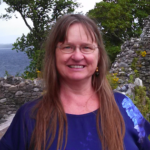 I’m Katherine Lato, vice president of communications for PBDD. This is the first newsletter targeted to our partner agencies.
I’m Katherine Lato, vice president of communications for PBDD. This is the first newsletter targeted to our partner agencies.
Thanks to all who contributed comments to our white paper on what makes a best-in-class bridging agency. A revised version is available at: AnatomyOfBestInClass-v1.0. If you have any comments, please let us know.
